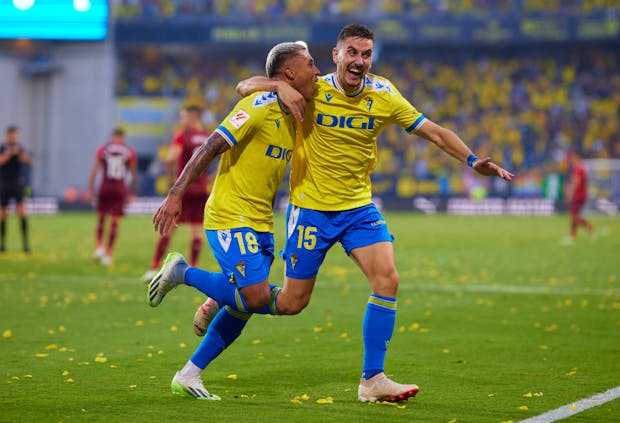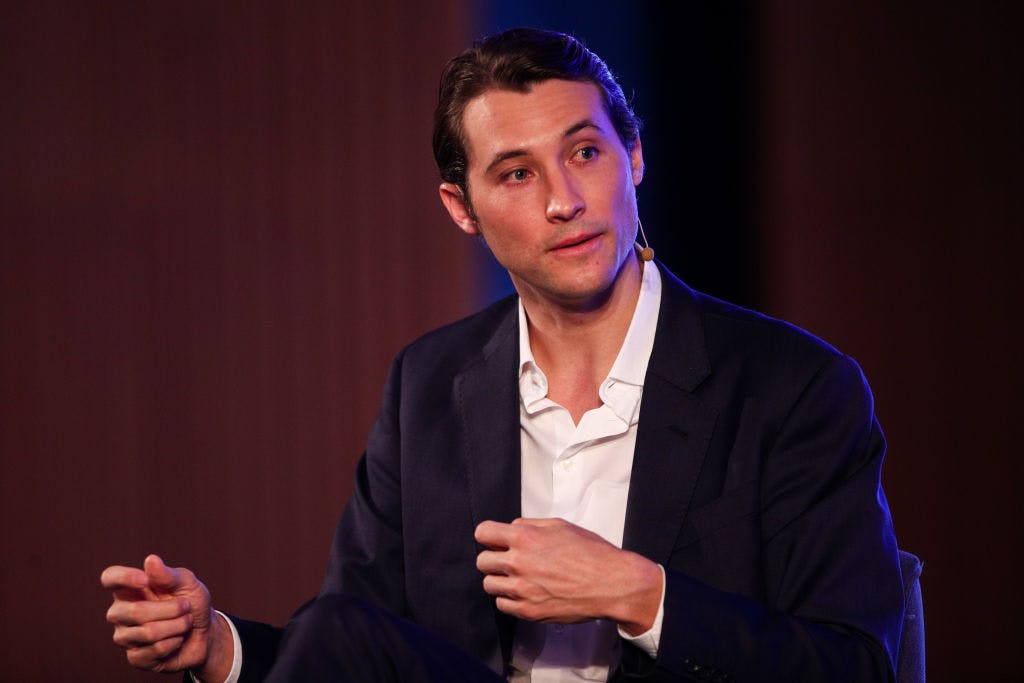
Walk the streets of New York, Miami or Los Angeles, and it will not be difficult to find adults and kids alike sporting FC Barcelona and Real Madrid jerseys. Travel around Spain and you’d be hard-pressed to find such a display of Cádiz CF shirts.
Located in a port city in the Andalucia region of southwestern Spain, the club barely registers in the annals of Spanish football, let alone European.
So making them a commercial presence some 5,700km across the North Atlantic Ocean appears somewhat of an over-ambitious project.
Yet that is exactly the goal of Ben Harburg, the American businessman and managing partner of global investment firm MSA Capital, who holds a minority 6.5 per cent stake in Cádiz.
Harburg, whose current base is China, has taken it upon himself to grow the global footprint of Cádiz since joining the ownership group two years ago. Success, to date, has been achieved to varying degrees in the Middle East and parts of Asia, but up next is North America, specifically his home country of the US.

“I came in day one with a stated intent that my value added to the club would be this globalisation angle and looking for new eyeballs, new clicks, new sources of revenue outside because we’d kind of saturated the market,” Harburg (left) tells SportBusiness in an interview.
“There aren’t a lot of new fans we can bring in in Spain or in Europe, and not many sponsors that haven’t been picked over yet in our region or in the broader country. The only way, in my view, was to grow revenue was performance on the field — qualify for European competition, player trading — good player identification of talent, and we had a good transfer window, selling players and the third one was finding new sources of revenue. The only way to find new sources of revenue was going west, going out into the world.”
Cádiz is hoping to leverage LaLiga’s growing presence in North America, much of which is thanks to LaLiga North America, which is based out of a New York City office. LaLiga has launched various fan engagement initiatives, including watch parties and local activations, signed North America-specific sponsorships and leveraged its long-term, $1.4bn (€1.3bn) deal with ESPN that runs through 2028-29 with American-focused content and friendlies in the preseason. LaLiga has even aimed to play regular season matches abroad in the US after LaLiga North America was launched in 2018, but such plans were halted by courts.
As part of growing LaLiga and specifically Cádiz in the US, ESPN and Cádiz are working together on a documentary about the club. Harburg describes Cádiz as similar to Sunderland AFC, whose Sunderland ‘Til I Die documentary series on Netflix was one of the first popular sports docuseries with an international audience. Though, Cádiz is not Sunderland — trying to climb back to the heights of the Premier League — nor are they like Wrexham AFC, with celebrity North American owners trying to resurrect a once prosperous club from the depths of non-league football.
“We’ve got to find a narrative that resonates with Americans,” Harburg says. “So, David vs Goliath, the underdog narrative, taking a kind of Moneyball narrative where we have a limited capital space but use it to beat the likes of Real Madrid and Barcelona and Atletico Madrid over the last few seasons. Hopefully my existence as a bridge between America and the team helps.”
There are no American players in the Cádiz squad, albeit Harburg says that the club will continue to monitor talent as a way to “help catalyse interest in the club” in the US. Such a strategy is paying off for LaLiga rivals Celta Vigo, which has American midfielder Luca de la Torre. Celta played in the US during a pre-season tour, despite the club finishing 13th in the previous campaign, one place above Cádiz.
Cádiz and Harburg’s strategy began in China, a market Harburg describes as being “relatively under-addressed” before shifting to the Middle East, then Southeast Asia and then Africa.
Instead of keeping social media in-house with translated content, Cádiz made the approach of localising it with regional social media managers who understand local culture and memes, helping grow its Middle East social media channel to nearly 40,000 followers.
The club has also partnered with the successful Egyptian club Al-Ahly as well as teams in Malaysia, Indonesia, Qatar, UAE and most notably with Saudi Arabia’s Al Nassr before Cristiano Ronaldo joined from Manchester United in January 2023. These club partnerships have helped grow the stature of Cadiz in their local markets and allow for friendlies and potential transfers between teams.
“If there was any [cash flow] it comes our way,” Harburg says. “These are fairly low-barrier to entry, low-obligation partnerships. We say, ‘let’s announce a brother or sister club and let’s do social media activations, let’s explore club friendlies’.”
Profitability, private equity and the European Super League
Cádiz tries to take a “thoughtful” approach to constructing its squad so not to “overlean our skies” and fall into financial trouble.
“We take flack for it,” Harburg says. “Our fans think we’re penny pinchers, they think that we’re not spending as much money. The most painful period of the year is the transfer window because everyone’s on us.”
The club looks to get influxes of cash from sponsorships, especially now that the team is marketable in new places in the world. Cádiz’s front-of-shirt sponsor is Digi, the telecoms arm of Romanian company Digi Communications. The club does keep its local ties too, including the local Cádiz Provincial Council sponsoring the club in a back-of-shirt deal.
“Getting sponsorship in football is one of the most frustrating things I’ve ever encountered. It’s so unsystematic, so opportunistic. When I arrived everyone was with the betting companies, and now no. Then bitcoin and crypto. Now we’re scrambling because tech is down and betting is off limits.”
Ben Harburg, minority owner, Cádiz CF
“Getting sponsorship in football is one of the most frustrating things I’ve ever encountered,” Harburg says. “It’s so unsystematic, so opportunistic. When I arrived everyone was with the betting companies, and now no. Then bitcoin and crypto. Now we’re scrambling because tech is down and betting is off limits. We’ve got to be creative. Our global footprint gives us a more realistic chance of getting sponsors than most other clubs even if we don’t have players from those countries.”
LaLiga also helps through cash injections from CVC Capital Partners, creating LaLiga Impulso. In 2021, CVC set out a plan to invest around €2bn in LaLiga that was approved by clubs and in June this year LaLiga received its third payment, worth €482m from the agreement. CVC acquired an 8.2 per-cent stake in LaLiga’s commercial rights unit and guaranteed the private equity firm a piece of LaLiga’s revenue for the forthcoming 50 years.
Real Madrid, Barcelona and Athletic Club were among teams who voted against the 2021 deal and have not received funding through the agreement. Some clubs, including Villarreal, Real Sociedad and Real Betis have used funding for stadium remodeling.
In 2022, Cádiz unveiled Sportech City, a project partly funded by LaLiga Impulso to renovate its stadium and build a business and technology centre next to it. Two months ago the club posted renderings and announced its plan to secure the land around the stadium.
“I don’t feel any pressure from CVC. Obviously, our partners in this are LaLiga,” Harburg says. “LaLiga has been a great ally. When I go to a market like Nigeria, they can connect us with the top clubs and media agencies but most of this we’ve done on our own. The social media we’ve done on our own, we’ve had to build our own channels. This can be done on a pretty shoestring budget so we’re not spending huge amounts of money doing user acquisitions or paid promotions.”
Harburg is one of many American investors and owners in LaLiga and in global football at large. He says that relative to American sport, the buy-in price is attractive but that the risk remains higher than in US major sports leagues where relegation does not exist.
“Outside of the Premier League, you don’t have to earn boatloads of capital each year to sustain these clubs. Because of these success stories like AC Milan [owned by US private equity firm, RedBird Capital] and Wrexham that creates a mirage that everyone can do it, which we know is not the case.”
Beyond relegation, is the ever-looming European Super League, with clubs like Barcelona and Real Madrid still interested in pulling away from LaLiga. If — or more likely when — Super League plans resurface, teams like Cádiz could be at risk of fading into irrelevancy.
“It’s created a Cold War dynamic where even when we have a big LaLiga ownership meeting those guys don’t show up and they send a proxy lawyer,” Harburg says. “For us small clubs it remains a concern because it would wipe us off the map or at least turn us into a de facto second division with basically nothing to play for other than a little bit of pride. Still very much a fear, obviously mitigated, but not gone.”